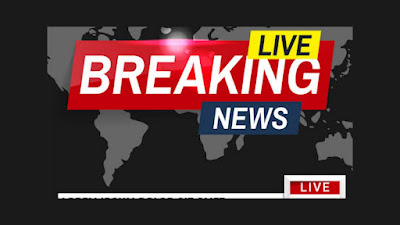By Rupert Wingfield-HayesBBC News, Taiwan
Foreign minister, Joseph Wu, condemns China's military drills around Taiwan
Taiwan's foreign minister has defended US Speaker Nancy Pelosi's brief but controversial trip to the island in an exclusive interview with the BBC.
Joseph Wu condemned the large-scale military exercises that China began around the island on Thursday.
He said Ms Pelosi's visit was "extremely significant" and China's response would not stop democratic politicians being invited to Taipei.
Mr Wu also warned that China's territorial aims go far beyond Taiwan.
For the past six years Mr Wu has been the public face of Taiwan's campaign for greater international recognition. He negotiated Nancy Pelosi's visit, and he is now dealing with its rather frightening aftermath.
But Taiwan's foreign minister is not about to apologise. The whole point of Ms Pelosi's trip was to bring attention to this often forgotten and little understood island.
China sees Taiwan as a breakaway province that will eventually be under Beijing's control. However, Taiwan is a self-ruled island that sees itself as distinct from the mainland.
But any hit of recognition of this by world leaders enrages China - it announced on Friday that sanctions have been placed on Ms Pelosi and her family over the visit.
"China has long been trying to isolate Taiwan internationally," Mr Wu says.
"For an important leader like Speaker Pelosi to have the opportunity to visit Taiwan is very significant. To raise the profile of Taiwan and to allow the international community to understand that Taiwan is a democracy."
He is quick to add that it is not Taiwan that has fomented this crisis. It is Beijing, he says, that is trying to change the rules.
"We want to maintain the status quo," he says, "which is that Taiwan has no jurisdiction over mainland China and the People's Republic of China (CCP) has no jurisdiction over Taiwan. That is the reality."
- ON THE GROUND: Taiwan's 'Pelosi lovefest'
- EXPLAINER: China and Taiwan: A really simple guide
- BACKGROUND: Nancy Pelosi's long history of opposing Beijing
The minister is describing a reality that has stood for 73 years, ever since China's nationalist leader Chiang Kai-Shek fled to Taiwan after losing the civil war.
For decades the two rival Chinese dictatorships, one nationalist (Kuomintang, or KMT), one communist (CCP), stared at each other across the Taiwan Strait, neither strong enough to attack the other.
But in the past 25 years two things have changed. China has got rich, and Taiwan has got democracy.
Democracy has brought a very different political party to power in Taipei.
The Democratic Progressive Party (DPP) is led by President Tsai Ying Wen, and her foreign minister Joseph Wu. They are Taiwanese to the bone, and the values they espouse are not Chinese nationalism, but democracy and human rights.
"In terms of democracy Taiwan is ranked number one or number two in east Asia," Mr Wu tells me proudly.
"On the index of freedom Taiwan is ranked number one, on economic freedom Taiwan is also at the top. Taiwanese people enjoy democracy, freedom and the value of human rights, that put Taiwan in the democratic world," he says.
Indeed, Taiwan is classed as "free" by non-profit US-based research organisation, Freedom House (it has classed Chinas as "not free" in 2022) and the Brookings Institution largely applauds the island's democratization.
The problem for Taiwan is that China is now rich, and with that wealth it has built a huge war machine. Meanwhile, Taiwan has for too long relied on the 100-mile-wide Taiwan straits, and America, to keep it safe.
Joseph Wu admits that is no longer tenable.
"Defending Taiwan is our own responsibility," he says.
"We have the will and the capability. We need other countries to provide Taiwan with defensive articles, but defending Taiwan is our responsibility, we are not asking other countries to sacrifice their lives to protect Taiwan."
Those are brave words. And Taiwan's young generation appears to have a far stronger will to fight than their parents.
But computer modelling suggests China's People's Liberation Army (PLA) would crush Taiwan's outdated forces in a matter of days. If that is allowed to happen, Mr Wu says it would be a huge mistake that would only encourage China to go further.
He describes China's behaviour as "expansionist".
"Look at their behaviour over Hong Kong, or claiming the East China Sea and the South China Sea. It is the typical expansionism of an authoritarian state.
"Countries in this region need to watch out for what China is trying to do. Taiwan is not going to be the last piece in Chinese dream of expansionism."
With additional reporting by Tiffany Wertheimer.
China and Taiwan: The basics
- Why do China and Taiwan have poor relations? China sees the self-ruled island as a part of its territory and insists it should be unified with the mainland, by force if necessary
- How is Taiwan governed? The island has its own constitution, democratically elected leaders, and about 300,000 active troops in its armed forces
- Who recognises Taiwan? Only a few countries recognise Taiwan. Most recognise the Chinese government in Beijing instead. The US has no official ties with Taiwan but does have a law which requires it to provide the island with the means to defend itself
-
- 1 day ago
-
- 23 hours ago
-
- 2 days ago






comment 0 Comments
more_vert